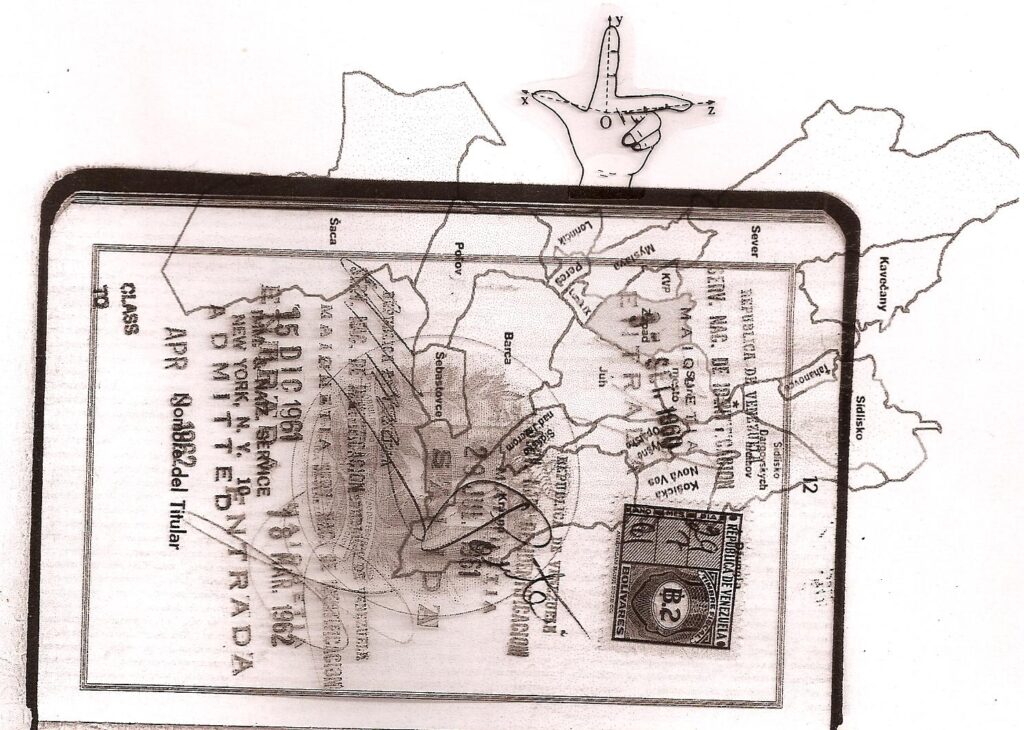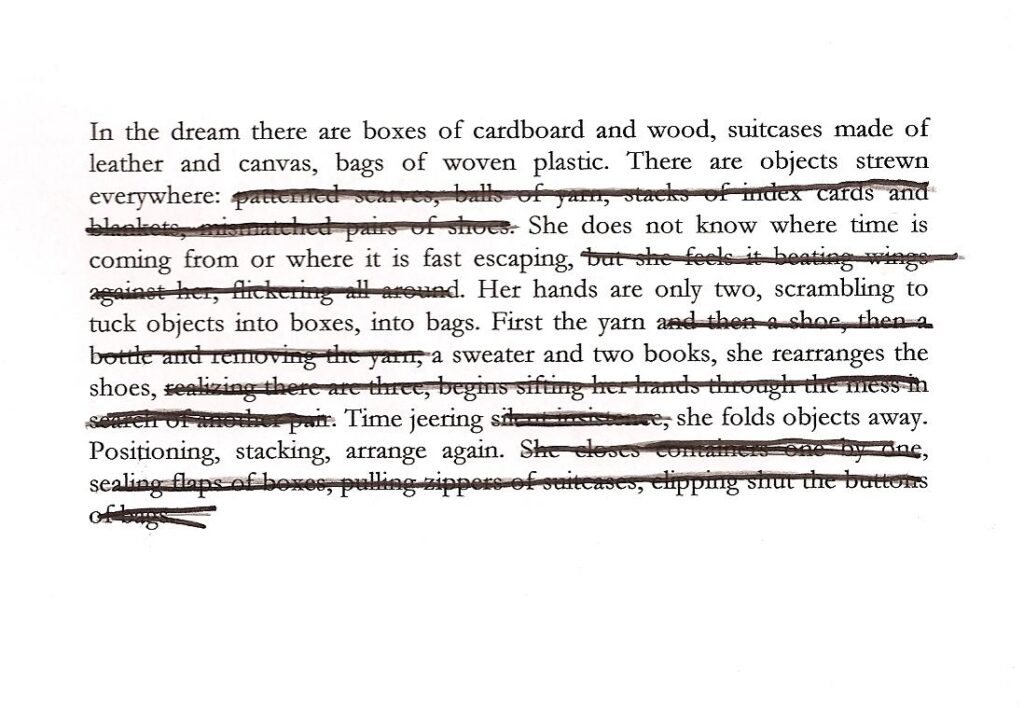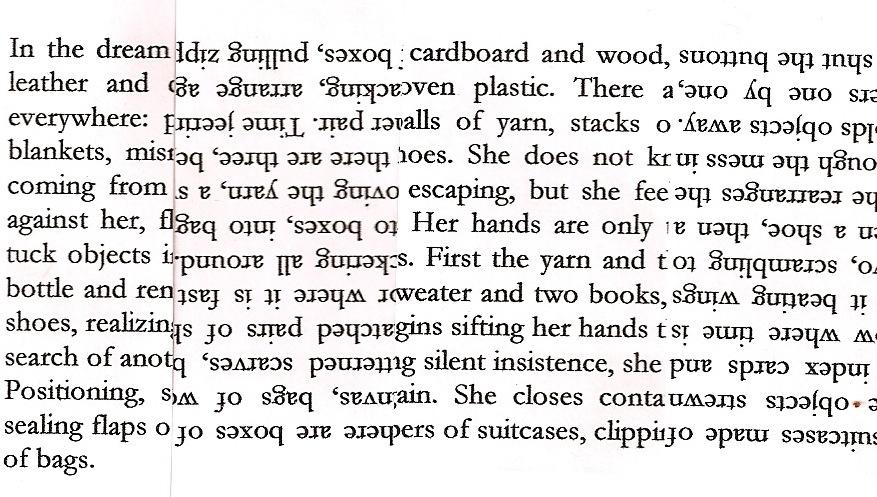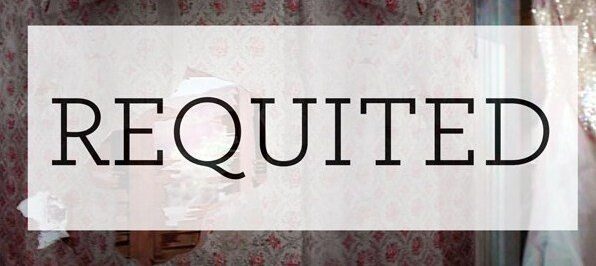These pages are excerpts from a larger project called Claim, a hybrid poetry/prose and text/image work that began as an oral history project tracking the author’s family’s migrations through Europe, the Middle East and the Americas. It became an exploration of memory and the language used to claim identity, history, and place. Much of the language is “found” or gleaned from these interviews. As a whole, the piece asks questions about nationalism, land ownership and intergenerational trauma.

families spread slow spilled water cross, leak, seep terrains
Dear Nation,
Bread your Sunday morning, your pioneer beginning.
Will not be.
Dear Nation,
What is claim, what is anchor?
What myth stitches
history to place?
What stitch
myths people
to nation?
Where is the road?
What are the names?
What is
the land like?
What anchor, what root?
What un-
peopled soil?
Where is the road?
Parched mouth of memory.
Loosen wrought letters,
Pull up soft plots.
Pull up soft plots.
A shovel, no lantern.
What anchor, what
claim?
Someone extends a hand.
What root?
their trans-Atlantic journey
mother (theirs) taught her daughters (mother, mine) the Latin alphabet
mothered the Latin alphabet
alphabet becomes new home
Romanian, German, and Hebrew they had already stitched
roofs of their mouths
spoken becomes roof
my grandmother traced the letters:
round vowel bellies rock of tide
sharp-ended consonants ship’s mast
letters become a boat, take from and towards
going to
mother (mine) envisioned grandeur of New York, golden plains of Texas, California sun
imagined speaking English all glamour (hers) grandeur (nation)
hard, blocky, words like the movies
mother (theirs) revealed America approaching (theirs) was South America
language was Spanish
long rock of tide, of seasick nights
Dear Immigrant,
Try on the tongues. You’ll find no war here.
Tumble of language, a word un-tongued.
Pride reaches, lingers, dangles
off

SONNET I.
I dream.
Sit on the sand bed and watch
the bottom of that freighter cut blue
pull, touch its hydraulic rudder.
Salt of story on sea-lips, its many passengers.
Outside the dream, up above
the brackish water
I wince at recognition.
What roots run between body continents, seabeds?
Hesitate to name, be named. I is fiddled,
fidgeted, wants Atlantic anonymity, an us
of swept breath. No-name drifts between
them and I, between I
and brine and algae.
Rachel grew up in West Texas, where parched land scrolls out endlessly, everything a shade of distance. She tells me over many years of friendship.
Four generations knuckle-bound to land that grabbed and held. An old rancher once told her: “Out here it’s impossible to be lonely. The land walking beside you is your oldest friend, like already you’ve told the best stories and each of you knows how much the other made up.” A yawning sky, a hotfoot sun, horizon line a crease beyond. These are her drawling plains, cowboy bodies desert stiff.
Rachel’s mother has lived through three fires. Charred remains of memory across brittle blackened land.
Her mother, reaching tongue of an agave plant, rising slow from a crack in the dust. Her mother, blooming into woman, walking the desert earth, curving where the dunes flatten, skin spackled macula.
And the fire. Photographs disintegrating into tumbling ash, memories liquefied to plaster and molasses. Bare feet scorched by flame, flames licking the walls of the house, each glowing ember a year of her life.
Anchor to ground. What root?
Things fall away. Tongues of red blaze. Tin pot enveloped in soot. Nightgown hem smolder-curled.
Dear Immigrant,
Claim ownership to overlay.
Lay heaviest of roots
of skin and ground and steady
of knuckle-bound beginning.
POSTCARD I.
Sambath, born in a refugee camp on the Thai/Cambodian border, says “Searching desperately for ancestry is a common trait of white Americans. Your identity is built on the backs of others, your land, your stories, even your memories are stolen.”
How do you write yourself out of a myth?
Words are permeable, punctures in the sieve.
POSTCARD III.
Camilo, born of a Cuban woman and a Brooklyn Jew, says “Being Jewish is almost a synonym for cultural hybrid or nomad: so many of us have more than one cultural identity, and have been waging cultural, political battles within our families for a clearer definition of our legacy as a people.”

Something will stand here,
rafters, pretext, bedrock
they say we speak in finger-flight
dextrous gestures, roaming motions
“An architect builds structures of their hands,” she observes
calculated dialect, born angles, apex, slant
hands to serve as bricks and beams
“Your mother, my sister, they do the same thing.”
make roof, knit flat-palm, interstice
make burgeoning geometry
gable tented two hand fold
Dear Immigrant,
Lay heaviest of roots
of skin and ground and steady
of knuckle-bound beginning.
Claim land claim home claim country
claim natural claim tongue
take hold
and build.
I have never been from any one place she says, When I was learning Hebrew, we spoke Rumanian at home. When I was learning Spanish, we spoke Hebrew at home. When I was learning English, we spoke Spanish at home. It’s like I could never catch up fast enough.
Threads of language unravel before my mother, her busy fingers try to braid them. Wind-blown, untamed threads.
undone un-there a bag of dried beans
un-peopled or grains of rice
glassy marbles un-tongued
tip over and spill out
Mónica Gomery lives in Boston, MA. She is a graduate of the Creative Writing program at Goddard College, and the Drisha Institute Arts Fellowship. Her writing has appeared in Shearsman Magazine, Scythe, Shadowtrain, Word For/Word, and Bridges Journal. She co-founded and co-edited Never on Time Journal, a community poetry project in Philadelphia. Most recently she is studying ancient languages and learning how to pray, en route to rabbinical school.
